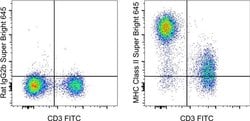Learn More
MHC Class II (I-A/I-E) Monoclonal Antibody (M5/114.15.2), Super Bright™ 645, eBioscience™, Invitrogen™


Rat Monoclonal Antibody
$412.00
Specifications
| Antigen | MHC Class II (I-A/I-E) |
|---|---|
| Clone | M5/114.15.2 |
| Concentration | 0.2 mg/mL |
| Applications | Flow Cytometry |
| Classification | Monoclonal |
Description
Description: This DS5MMER monoclonal antibody recognizes mouse MerTK, a 170-210 kDa member of the TAM family of tyrosine kinase receptors that also includes Axl and Tyro3. MerTK is expressed on tissue macrophages and is involved in the removal of apoptotic cells. This process relies on two soluble ligands of MerTK, Protein S and Gas6 that bind to phosphatidylserine found on the outer leaflet of the plasma membrane of cells undergoing apoptosis. Upon binding these ligands, MerTK undergoes autophosphorylation at multiple tyrosine residues that activate the PI3K and Akt pathways. This results in the phagocytosis of apoptotic cells and also results in the direct inhibition of TLR-induced production of pro-inflammatory cytokines. In addition, MerTK may function as a putative entry receptor for filoviruses. Deficiency of MerTK causes general autoimmunity, inflammation and accumulation of apoptotic bodies. MerTK is constitutively released from the cell surface by metalloproteinases and thus is present in the serum and culture medium. This process can be enhanced by stimulation with LPS. MerTK can be used to help discriminate macrophages from dendritic cells. MerTK is often expressed on maligt cells and may be implicated in immune evasion. Applications Reported: This DS5MMER antibody has been reported for use in flow cytometric analysis. Applications Tested: This DS5MMER antibody has been tested by flow cytometric analysis of resident peritoneal macrophages.
MHC (major histocompatibility complex) class II molecules are transmembrane glycoproteins expressed on the surface of professional antigen-presenting cells, such as macrophages, dendritic cells and B cells. Before their exposition on the cell surface, the MHC class II molecules react with endocytosed exogenous antigens, which are then presented to the T cells. The antigen-binding grove between MHC class II alpha and beta chain is open at both ends and is 15-24 amino acid residues long. HLA and MHC antibodies play a significant role in Immunopeptidomics, facilitating the identification and characterization of neoantigens through high-performance liquid chromatography coupled to tandem Mass Spectrometry.Specifications
| MHC Class II (I-A/I-E) | |
| 0.2 mg/mL | |
| Monoclonal | |
| Liquid | |
| RUO | |
| 14960, 14961, 14969 | |
| Primary | |
| 4°C, store in dark, DO NOT FREEZE! | |
| H2-Aa |
| M5/114.15.2 | |
| Flow Cytometry | |
| Super Bright 645 | |
| Rat | |
| Mouse | |
| IgG2b κ | |
| Affinity chromatography | |
| Antibody |
For Research Use Only
The Fisher Scientific Encompass Program offers items which are not part of our distribution portfolio. These products typically do not have pictures or detailed descriptions. However, we are committed to improving your shopping experience. Please use the form below to provide feedback related to the content on this product.

